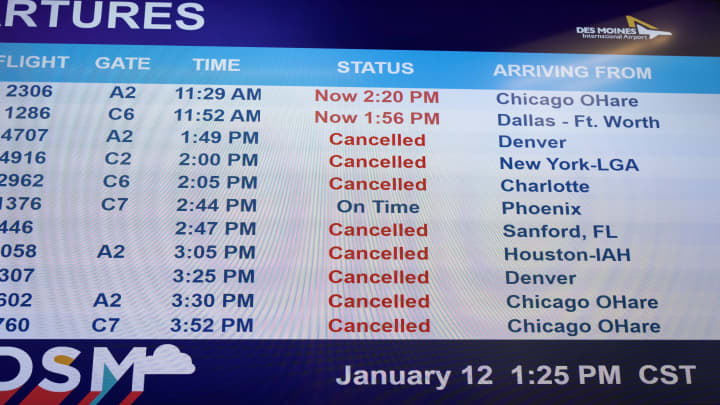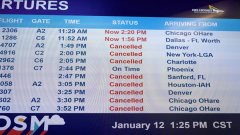
Airlines canceled more than 3,000 U.S. flights Friday as they grappled with winter weather and the of 737 Max 9 planes.
Storms in the Midwest helped drive more than 8,400 delays, with disruptions around Chicago and Detroit, major hubs for the largest U.S. carriers, according to flight-tracker FlightAware. Disruptions continued, with 1,700 cancellations and more than 700 delays as of Saturday morning.
About 40% of flights at Chicago's O'Hare International Airport, a hub for and , were canceled after a snowstorm led to an over . Detroit Metropolitan Wayne County Airport, a hub, had more than half of flights Friday either delayed or canceled due to the storms.
, which has a big operation out of Chicago Midway, canceled more than 400 flights, while over 1,500 were delayed.
United canceled about 10% of its mainline flights and delayed about 30%.
Last week, the Federal Aviation Administration grounded 737 Max 9s so the jets could undergo inspections after a door plug blew off an flight. That grounding has continued to disrupt travel for United and Alaska Airlines, the only U.S. airlines operating the aircraft.
Airlines are awaiting the FAA's approval of inspection instructions from Boeing. The FAA said late Friday that it needed more data on inspections before it could approve those directions.
"Upon a full review of the data the FAA will make a determination whether the instructions satisfy compliance with the highest standard of safety," the agency said.
Alaska Airlines said Friday that they would cancel all flights on the Max 9 through Sunday as it waits for documentation from and the FAA to begin inspections.
About 20% of Alaska's flights were canceled Friday and more than 10% were delayed, FlightAware data showed. Alaska said that between 110 and 150 flights per day would be impacted by the grounding of the Max 9.
United Airlines said it canceled flights scheduled to use a Max 9 through Tuesday. It has about 200 flights a day scheduled on the aircraft but it will use another plane for 30 of those flights.
"By canceling this far in advance, we're trying to create more certainty for our customers and more flexibility for our frontline teams to do their work," United said in a statement late Friday. "Those things will be especially important as we also manage disruptive winter weather throughout much of the country."
—CNBC's contributed to this report.




